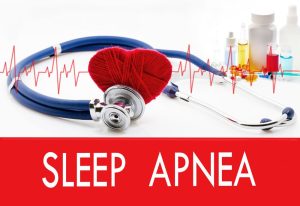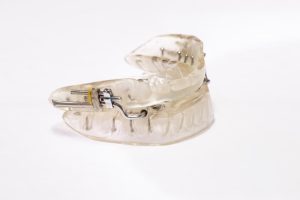
Sleep apnea can increase the risk of medical conditions, such as type 2 diabetes, heart attack, Afib, and stroke. Eventually, heart failure can occur because the heart isn’t pumping enough blood to the rest of the body.
To determine whether sleep apnea is causing your snoring and putting unwanted strain on your heart, call the New York snoring specialists of Silent Night Therapy at 631-983-2463 today.
Types of Sleep Apnea
Sleep apnea is a sleeping disorder causing repeated episodes of stopped or interrupted breathing. You might have sleep apnea if you feel excessively tired during the day, even after a full night’s sleep. Many people realize they might have sleep apnea because their partner informs them of their loud snoring.
Two main types of sleep apnea can lead to heart problems:
- Central sleep apnea – Central sleep apnea occurs when the brain doesn’t transmit the necessary signals to the muscles controlling a person’s breathing.
- Obstructive sleep apnea – Obstructive sleep apnea occurs when the muscles at the back of the throat relax, cutting off airflow to the lungs.
The signs of obstructive sleep apnea and central sleep apnea are similar. The most common symptoms of sleep apnea include:
- Morning headaches
- Loud snoring
- Gasping for air while sleeping
- Trouble paying attention while awake
- Irritability
- Episodes of stopped breathing during sleep
- Waking up with a dry mouth
- Excessive daytime sleepiness
- Trouble staying asleep
The Connection Between Snoring and Heart Function
You don’t necessarily have an issue with your heart if you’re a chronic snorer. However, loud snoring can be a sign of sleep apnea. Since sleep apnea can affect your health, determining the underlying cause of your loud and chronic snoring is crucial.
Typically, obstructed breathing causes a person to snore. Obstructive sleep apnea occurs when the muscles supporting the soft tissue in the throat relax temporarily. The relaxed tissue closes or narrows the airway, momentarily cutting off breathing.
Breathing interruptions can happen twenty to thirty times an hour as you sleep. Constant interruptions can lead to a drop in blood oxygen levels. The brain jolts a person partially awake to take a deep breath. Typically, people don’t remember waking up throughout the night because of breathing troubles. However, this repetitious sleep interruption often causes daytime sleepiness and other problematic symptoms.
Research has shown chronic snoring can lead to the thickening of the carotid arteries. These arteries carry oxygenated blood to the brain. When they thicken, blood can’t flow as easily as it should because the passageway is too narrow. The narrowing can lead to a build-up of various substances, such as:
- Calcium
- Fats
- Fibrin
- Cholesterol
- Cellular waste products
The arteries eventually begin to harden from the build-up of these substances. This hardening can cause blockages and lead to a heart attack.
When someone experiences constant breathing interruptions, a surge in adrenaline and cortisone occurs. These two stress hormones contribute to high blood pressure, heart failure, and heart attacks. Constantly being jolted awake strains the heart and the entire cardiovascular system.
How to Diagnose Sleep Apnea
If you believe you suffer from sleep apnea, seeking immediate treatment is critical. You should see your doctor and undergo tests. Typically, medical providers evaluate a person’s sleep history and various signs and symptoms they experience to determine if they have a sleep-related breathing disorder.
You might also need an evaluation at a sleep center to monitor your breathing and other bodily functions as you sleep. Two common tests for sleep apnea are:
- Nocturnal polysomnography – The sleep specialist hooks you up to equipment while you sleep. The equipment monitors your heart, breathing patterns, brain and lung activity, blood oxygen levels, and leg and arm movements.
- Home sleep test – You can take a sleep test at home if you want to feel more comfortable. At-home tests monitor breathing and airflow patterns, heart rate, and blood oxygen levels.
Treating Sleep Apnea

Although CPAP therapy can benefit people suffering from sleep apnea, many find it uncomfortable. At Silent Night Therapy, we offer an alternative solution for individuals who don’t experience much relief after trying a CPAP machine.
Oral appliance therapy is a more comfortable treatment for sleep apnea patients. You wear the oral appliance like an orthodontic retainer. It fits over your teeth and supports your jaw in a forward position so your airway stays open while sleeping.
Silent Night Therapy offers four types of customizable oral appliance devices:
- Respite Blue+ – The Respite Blue+ is a personalized, custom mouthpiece featuring a dual-block design and interlocking wings. You can sleep in any position while wearing it. It keeps the airway open and allows for a range of mouth movements while sleeping.
- Dynaflex Dorsal – Our Dynaflex Dorsal device is one of the most popular oral appliances to treat obstructive sleep apnea and snoring. The two-piece device allows for lateral jaw movement and comfort.
- The Adjustable Herbst – The Adjustable Herbst is a two-piece device with hinged mechanisms and advancement screws. It allows for the advancement of the mandible and titration. The design of the appliance enables incremental advancement of the mandible until you find the desired position.
- The EMA – The Elastic Mandibular Advancement (EMA) is our smallest appliance for treating obstructive sleep apnea. Straps of varying flexibility and lengths hold individual trays made of 2mm vacuum form material together. The straps allow for comfort and lateral movement. As you sleep, you can also dictate the amount of mandibular advancement for a comfortable position.
Contact Silent Night Therapy Today
Silent Night Therapy has treated patients with sleeping-related breathing disorders since 1983. Our team offers quality services to alleviate bothersome symptoms for a better night’s sleep.
If you suffer from chronic, loud snoring, call us at 631-983-2463 immediately or 631-983-2463. We can evaluate you to determine your diagnosis and provide the appropriate treatment.
Related posts: